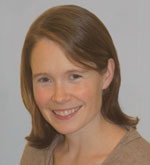
UMF Professor Kristen Case has a great book just out. She’ll be appearing at the bookstore on Jan. 26 and we asked her to test her mettle by tackling a hard hitting Daily Bulldog interview.
Kenny: Was American Pragmatism and Poetic Practice the original title of the book? There’s a feeling around the store that the title isn’t quite as exciting as the contents.
Kristen: My sentiments exactly. The title was the publisher’s choice, though I got to modify it a little. It was chosen for marketing reasons about which I know nothing. The original title was ‘A Bird’s Life’: Pragmatism in the Field of Twentieth-Century American Poetry. William James described thinking as being “like a bird’s life,” an alternation between flights and perchings. I’ve always loved that description, and I also thought it fit the non-linear structure of the book.
Kenny: If a highly cultured alien race asked for evidence that our species was worth preserving, and you were asked to choose one poem to send them as part of a response packet, which one would you choose?
Kristen: That’s an impossible question! That scenario fills me with anxiety! Here’s the one that speaks to me most today. If you asked me tomorrow it would be something else.
One Art
By Elizabeth Bishop
The art of losing isn’t hard to master;
so many things seem filled with the intent
to be lost that their loss is no disaster.
Lose something every day. Accept the fluster
of lost door keys, the hour badly spent.
The art of losing isn’t hard to master.
Then practice losing farther, losing faster:
places, and names, and where it was you meant
to travel. None of these will bring disaster.
I lost my mother’s watch. And look! my last, or
next-to-last, of three loved houses went.
The art of losing isn’t hard to master.
I lost two cities, lovely ones. And, vaster,
some realms I owned, two rivers, a continent.
I miss them, but it wasn’t a disaster.
—Even losing you (the joking voice, a gesture
I love) I shan’t have lied. It’s evident
the art of losing’s not too hard to master
though it may look like (Write it!) like disaster.
Kenny: Hmmn that line about “their loss being no disaster” may push things in the wrong direction entirely! How about a novel and a work of nonfiction instead.
Kristen: Woolf, To The Lighthouse ; Thoreau, Walden.
 Kenny: Great, now that the future of the species is more secure, let’s return to your book. What would be the best question you can imagine anyone asking about it?
Kenny: Great, now that the future of the species is more secure, let’s return to your book. What would be the best question you can imagine anyone asking about it?
Kristen: Hm. Maybe: Are the connections you find between the disparate American poets and philosophers you write about really there, or are you just making them up?
Kenny: Okay, that is a good question. And the answer?
Kristen: The answer is yes: both. I think the resonances I trace between poetry and philosophy are really there, but I also think that literary criticism is as creative as any other kind of writing; another reader would describe them very differently, or might not perceive them at all. One of the assumptions that guides the book is that what we see in a novel or a poem depends on all kinds of very personal and idiosyncratic things that are normally suppressed in scholarly writing. This book was an experiment in trying to tell the truth about some of those things. Pragmatism suggests that we’re part of the world, not aloof from it: knowledge is, in Dewey’s words, “a mode of participation.” We’re connected to the things we know about — perhaps especially the books we know about — and our knowledge is contingent, intimate, colored by our lives. So, yes, both: found and made.
Kenny: Thanks Kristen – we look forward to seeing you at the store on Jan. 26.
Kristen: Thanks, Kenny, I’m excited. I promise not to read for too long!





Kristen, I learn more about your work all the time! What a great interview. I might be biased, but I am wowed!